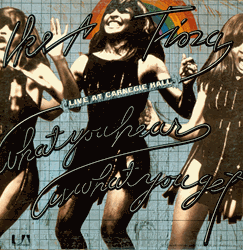Baby, baby, baby, I feel so all alone. Sometime I just CRY, I SIGH. Sometime I even moan. Because Baby, I don’t know what it is, But I FIND MYSELF livin’ at your will.
This is a bit out of line, because this is not an Ike & Tina song. But, but, but. . .when Jim Davis played it on 8-Track Flashback yesterday, my jaw almost hit the floor. I didn’t recognize the singer’s voice, and I was thinking: Is this a male Tina Turner impersonator?
Take a few minutes and listen to the entire track, which is fantastic:
I Don’t Know What You Got (But It’s Got Me)
The delivery (especially the spoken word interlude in the middle) is pure Ike and Tina style. The rhythm, the cadence. . I mean, even the way he is enunciating his words is the same.
So who sings it? None other than Little Richard.
This track was released in 1971, on an album of stuff Little Richard recorded for Vee Jay in the mid-60s. Go ahead and refresh your memory of Ike & Tina’s 1965 version of All I Can Do Is Cry. (My old post on that song here.)
In the Ike Turner autobiography, Takin’ Back My Name, both Ike and Little Richard weigh in on the question of Tina’s singing style and who gave it to her. (I’ve mentioned this before, but I know TBMN is very hard to find in the U.S., so I realized I should actually type out the related passages for you.)
Little Richard, in the book’s introduction:
When they first came to Los Angeles, I used to go over every day and Ike would be there with Tina and all of them. I remember when Tina couldn’t sing like she can today. Ike came and asked me to teach her. He asked me, ‘How would you sing this song?’ And when I sang, he would tell Tina, ‘Now, that’s what I want you to do.’ But when she talks today, she never mentions my name.
Ike, on his songwriting for the Ike and Tina Turner Revue:
I’d be writing songs with Little Richard in mind, but I didn’t have no Little Richard to sing them, so Tina was my Little Richard. Listen closely to Tina and who do you hear? Little Richard singing in a female’s voice. Little Richard taught Tina how to sing my compositions, so Tina concentrated on singing like a man while I honed her stage performance. I gave her attitude; I gave her movements to make on stage.
Furthermore, Tina, in her autobiography I, Tina:
I guess I had achieved success of some kind, but the truth was, it was constant hard work. If we weren’t onstage, we were on the road to the next show; if we weren’t on the road, we were in the studio–in every city, no matter where we were, he’d find a studio to work at. If we weren’t recording, we were rehearsing–running down songs, working out steps. It was nothing to drive seven hundred miles from one show to the next, Ike sitting in the backseat with his guitar, me and maybe an Ikette or two there with him, singing and practicing new tunes all the way. It never stopped. And the music — I know some people say those old records are classics now, but I hated them. And onstage, the music was so loud, so noisy, and the keys were all too high. Ike always had me screaming and screeching.
OK, that’s it for the literature review.
First, obviously Ike and Little Richard are overselling their influence on Tina. You can teach someone to sing like Little Richard all day long, but you are never going to find a talent like Tina. Her voice is something else, and the whole world knows it.
Little Richard is Ike’s friend from way back, and in this introduction he also chastises Tina for demonizing Ike and for moving to Europe and turning her back on all her old acquaintances. Both Ike and Little Richard take time in TBMN to make the case for why Tina should sign up to do one last reunion tour with Ike. I mean. . .please. Ike made millions of dollars off of Tina, it’s just ludicrous to make it sound like she owed him anything. And I know Little Richard is sensitive to slights, but he’s being an idiot recounting how she wouldn’t talk to him at some awards dinner, after her solo success. Any sane person can understand that a woman wouldn’t feel like socializing with the friends of her abusive ex-husband.
But second: I think the basic facts that a) Ike wrote with Little Richard’s voice in mind and b) Little Richard gave Tina pointers on her delivery are plausible. I mentioned this in regards to This Man’s Crazy, which is super-duper-Little Richard-esque.
Ike and Tina released their first single in 1960, when Little Richard was very popular — it makes sense that Ike would try to emulate his schtick. Tina is upfront about what an all-around control freak that Ike was about their revue, and you notice that she drops all that Little Richard style completely in her solo act.
I hope that someday an impartial biographer takes on the story of Ike and Tina Turner and publishes something comprehensive. Reading their autobiographies raises so many questions that I wish someone would investigate for corroborating evidence or further detail. The Little Richard-Tina Turner relationship is just one of them.

